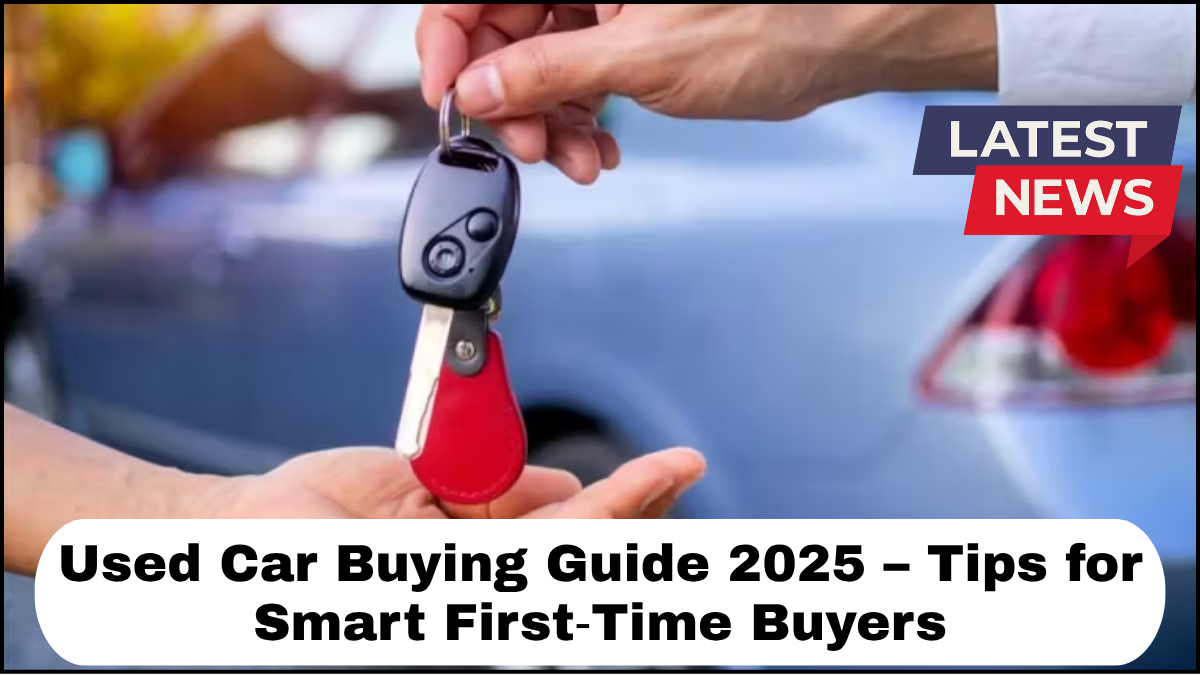Buying a used car can be a smart financial decision—if you know what to look for. The market in 2025 is more dynamic than ever, with evolving technologies, electric and hybrid options, and a surge in online car buying platforms. For first-time buyers, navigating this space can be overwhelming. This Used Car Buying Guide 2025 breaks down the process, giving you the insights you need to make a confident and informed decision.

Understand Your Budget and Total Costs
Before you start browsing listings, set a clear budget. Many first-time used car tips overlook total ownership costs—insurance, maintenance, registration fees, fuel, and possible repairs.
Example: A 2018 BMW might look like a steal at $15,000, but insurance and maintenance could push your annual cost well beyond what you’d pay for a more reliable Toyota or Honda.
Pro Tip: Stick to the “20/4/10” rule: 20% down payment, a loan no longer than 4 years, and monthly expenses (including insurance) under 10% of your gross monthly income.
Know What Type of Car You Really Need
It’s easy to get swayed by flashy features or high horsepower, but practicality should lead your decision. Ask yourself:
-
Do you need space for a family or cargo?
-
Will you be commuting long distances?
-
Is fuel economy a priority?
-
Will you drive in snow or off-road conditions?
Compact sedans, fuel-efficient hybrids, and certified pre-owned SUVs are top picks for many first-time used car buyers in 2025 due to their balance of value and reliability.
Research Vehicle Reliability and History
Not all used cars age gracefully. Some are known for engine issues, transmission failures, or costly recalls. Use tools like Consumer Reports, Kelley Blue Book, and NHTSA for recalls and reviews.
Vehicle History Report: Always request a Carfax or AutoCheck report to verify accident history, service records, mileage accuracy, and previous ownership.
First-time used car tip: Walk away if the seller refuses to provide a full vehicle history report. It’s a red flag.
Consider Certified Pre-Owned (CPO) Vehicles
CPO cars are inspected, refurbished, and sold by authorized dealerships with extended warranties. They often cost more than non-certified used cars but offer added peace of mind—especially valuable for first-time buyers still learning the ropes.
2025 update: Many automakers are expanding their CPO programs to include electric vehicles, offering extended battery warranties and specialized EV inspections.
Always Inspect and Test Drive the Vehicle
Never buy a car without seeing it in person or having it inspected by a trusted mechanic. Test driving helps you evaluate comfort, road noise, brake performance, steering response, and overall drivability.
Checklist for inspection:
-
Tire condition and alignment
-
Engine and transmission performance
-
Fluid levels and leaks
-
Dashboard warning lights
-
AC, heat, and infotainment functionality
Be Strategic When Negotiating
Don’t accept the sticker price. Use online tools to determine a fair market value and come prepared with comparable listings.
Tactic: Let the seller talk first. Once they make an offer, you have room to counter. If you’ve found issues during inspection, use them as leverage for price adjustments.
In 2025, many buyers also negotiate based on EV battery health reports, especially for hybrid or electric vehicles.
Understand Financing and Paperwork
Compare rates from banks, credit unions, and online lenders before stepping into a dealership. Sometimes, external financing options are more favorable than dealer-arranged loans.
Documents to review:
-
Bill of Sale
-
Title and Registration
-
Odometer Disclosure
-
Warranty Details (if applicable)
Avoid “as-is” sales unless you’ve done thorough due diligence.
Think Long-Term
Buy a car that not only fits your needs today but will continue to serve you reliably for years. Resale value, reliability, and maintenance costs matter more than gadgets and style.
Best 2025 used cars for first-time buyers:
Toyota Corolla, Honda Civic, Mazda3, Hyundai Elantra, and Ford Escape (CPO).
FAQs – First-Time Used Car Buying in 2025
Q1: What’s the best time to buy a used car in 2025?
A: End of the quarter (March, June, September, December) is ideal. Dealers are more likely to offer discounts to hit sales targets. Online marketplaces may also run seasonal promotions.
Q2: Is buying from a private seller safe?
A: It can be, but extra caution is needed. Always meet in public places, request full documentation, and have the car independently inspected.
Q3: Should I consider electric vehicles as a first-time buyer?
A: Yes, if you understand charging needs and battery life. Many EVs in the used market now offer good range and lower maintenance costs.
Q4: What’s the difference between a CPO and a regular used car?
A: CPO cars are inspected, certified, and backed by manufacturer warranties. Regular used cars don’t have this layer of protection but are often cheaper.
Q5: How do I avoid buying a lemon?
A: Get a full vehicle history report, conduct a third-party inspection, and avoid cars with salvage titles or unclear ownership history.
click here to learn more
